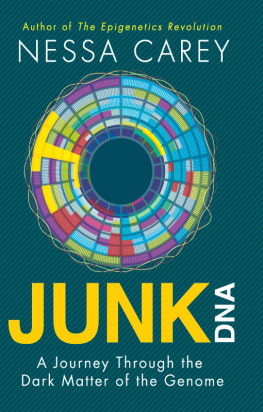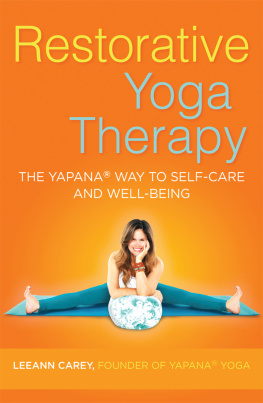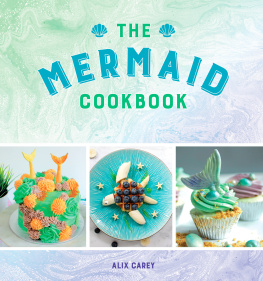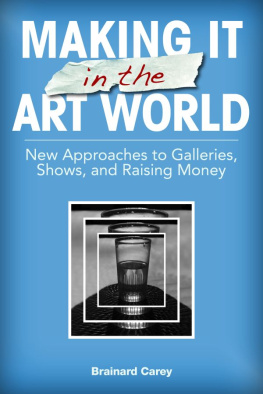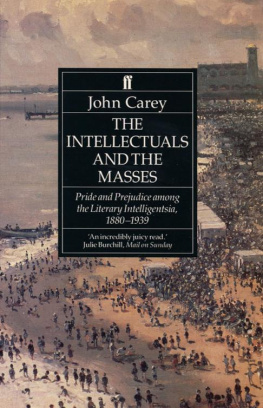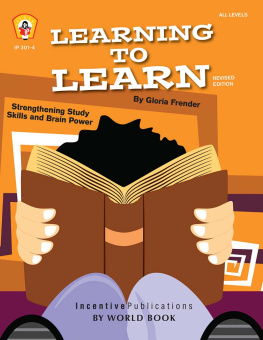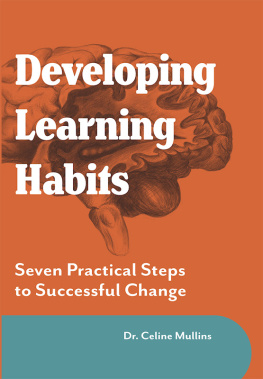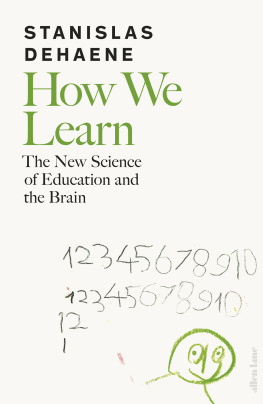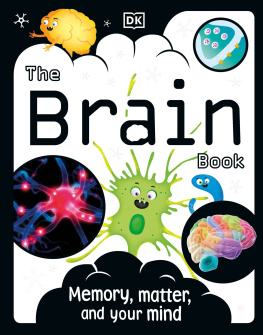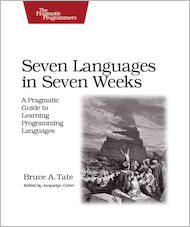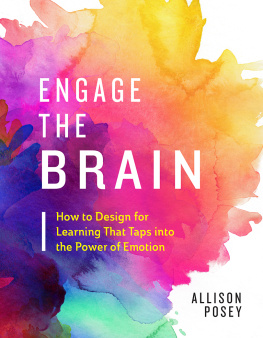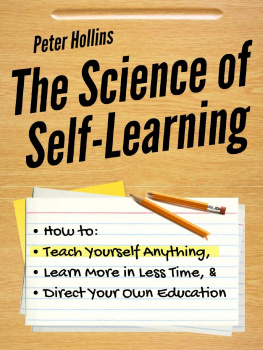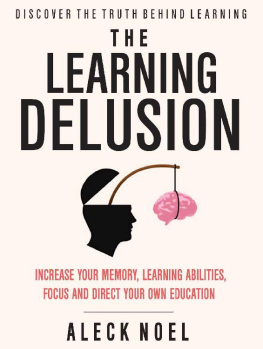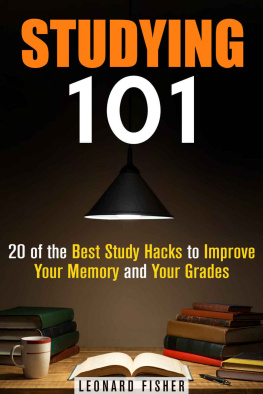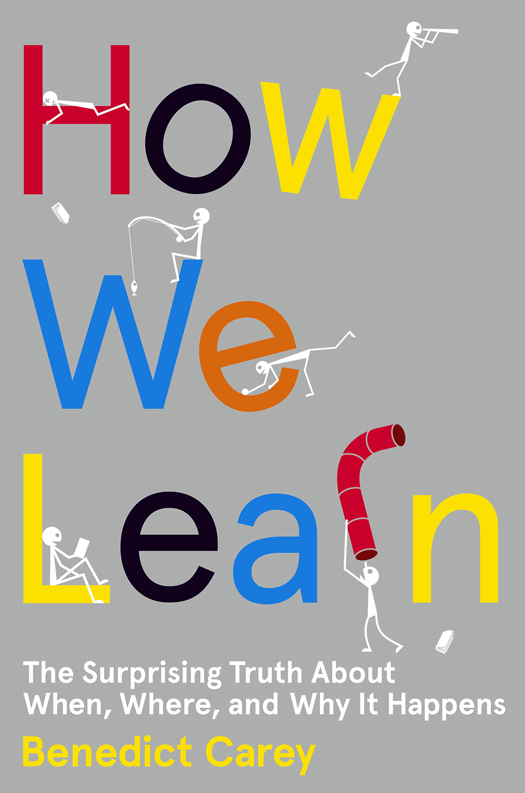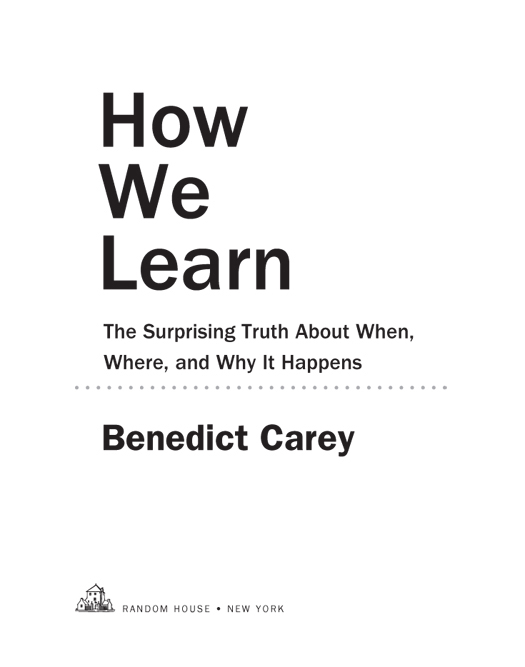Copyright 2014 by Benedict Carey
All rights reserved.
Published in the United States by Random House, an imprint and division of Random House LLC, a Penguin Random House Company, New York.
R ANDOM HOUSE and the H OUSE colophon are registered trademarks of Random House LLC.
Interior art credits:
). Courtesy of the artist.
, bottom left: Spring Creek Prairie 3, 2013, oil painting by Philip Juras. Courtesy of the artist.
: Henri Matisse, Portrait of Madame Matisse (The Green Line), 1905, 2014 Succession H. Matisse/Artists Rights Society (ARS), New York.
Library of Congress Cataloging-in-Publication Data
Carey, Benedict.
How we learn: the surprising truth about when, where, and why it happens/Benedict Carey.
pages cm
ISBN 978-0-8129-9388-2
eBook ISBN 978-0-8129-9389-9
1. Learning, Psychology of. 2. Learning. I. Title.
BF318.C366 2014
153.15dc23
2013049850
www.atrandom.com
Illustrations by Steve Clark and Zaremba
Cover design and illustration: Anton Ioukhovets
v3.1
Contents

1. The Story Maker
The Biology of Memory
2. The Power of Forgetting
A New Theory of Learning
3. Breaking Good Habits
The Effect of Context on Learning
4. Spacing Out
The Advantage of Breaking Up Study Time
5. The Hidden Value of Ignorance
The Many Dimensions of Testing
6. The Upside of Distraction
The Role of Incubation in Problem Solving
7. Quitting Before Youre Ahead
The Accumulating Gifts of Percolation
8. Being Mixed Up
Interleaving as an Aid to Comprehension
9. Learning Without Thinking
Harnessing Perceptual Discrimination
10. You Snooze, You Win
The Consolidating Role of Sleep
Introduction

Broaden the Margins
I was a grind.
That was the word for it back in the day: The kid who sweated the details, who made flashcards. A striver, a grade-hog, a worker beethat kidand I can see him clearly now, almost forty years later, bent over a textbook, squinting in the glow of a cheap desk lamp.
I can see him early in the morning, too, up and studying at five oclock: sophomore year, high school, his stomach on low boil because he cant quite masterwhat? The quadratic formula? The terms of the Louisiana Purchase? The Lend-Lease policy, the mean value theorem, Eliots use of irony as a metaphor for some damn thing?
Never mind.
Its long gone, the entire curriculum. All that remains is the dread. Times running out, theres too much to learn, and some of it is probably beyond reach. But theres something else in there, too, a lower-frequency signal that takes a while to pick up, like a dripping faucet in a downstairs bathroom: doubt. The nagging sense of having strayed off the trail when the gifted students were arriving at the lodge without breaking a sweat. Like so many others, I grew up believing that learning was all self-discipline: a hard, lonely climb up the sheer rock face of knowledge to where the smart people lived. I was driven more by a fear of falling than by anything like curiosity or wonder.
That fear made for an odd species of student. To my siblings, I was Mr. Perfect, the serious older brother who got mostly As. To my classmates, I was the Invisible Man, too unsure of my grasp of the material to speak up. I dont blame my young self, my parents, or my teachers for this split personality. How could I? The only strategy any of us knew for deepening learningdrive yourself like a sled dogworks, to some extent; effort is the single most important factor in academic success.
Yet that was the strategy I was already using. I needed something more, something differentand I felt it had to exist.
The first hint that it did, for me, came in the form of other students, those two or three kids in algebra or history who hadwhat was it?a cool head, an ability to do their best without that hunted-animal look. It was as if theyd been told it was okay not to understand everything right away; that it would come in time; that their doubt was itself a valuable instrument. But the real conversion experience for me came later, when applying for college. College was the mission all along, of course. And it failed; I failed. I sent out a dozen applications and got shut down. All those years laboring before the mast and, in the end, I had nothing to show for it but a handful of thin envelopes and one spot on a waiting listto a college I attended for a year before dropping out.
What went wrong?
I had no idea. I aimed too high, I wasnt perfect enough, I choked on the SATs. No matter. I was too busy feeling rejected to think about it. No, worse than rejected. I felt like a chump. Like Id been scammed by some bogus self-improvement cult, paid dues to a guru who split with the money. So, after dropping out, I made an attitude adjustment. I loosened my grip. I stopped sprinting. Broadened the margins, to paraphrase Thoreau. It wasnt so much a grand strategyI was a teenager, I couldnt see more than three feet in front of my faceas a simple instinct to pick my head up and look around.
I begged my way into the University of Colorado, sending an application along with a pleading letter. It was a simpler time then; its a state school; and I was accepted without much back-and-forth. In Boulder, I began to live more for the day. Hiked a lot, skied a little, consumed too much of everything. I slept in when I could, napped at all hours, and studied here and there, mixing in large doses of mostly legal activities for which large colleges are justifiably known. Im not saying that I majored in gin and tonics; I never let go of my studiesjust allowed them to become part of my life, rather than its central purpose. And somewhere in that tangle of good living and bad, I became a student. Not just any student, either, but one who wore the burden lightly, in math and physics, and was willing to risk failure in some very difficult courses.
The change wasnt sudden or dramatic. No bells rang out, no angels sang. It happened by degrees, like these things do. For years afterward, I thought about college like I suspect many people do: Id performed pretty well despite my scattered existence, my bad habits. I never stopped to ask whether those habits were, in fact, bad.
In the early 2000s, I began to follow the science of learning and memory as a reporter, first for the Los Angeles Times and then for The New York Times. This subjectspecifically, how the brain learns most efficientlywas not central to my beat. I spent most of my time on larger fields related to behavior, like psychiatry and brain biology. But I kept coming back to learning, because the story was such an improbable one. Here were legit scientists, investigating the effect of apparently trivial things on learning and memory. Background music. Study location, i.e., where you hit the books. Videogame breaks. Honestly, did those things matter at test time, when it came time to perform?


